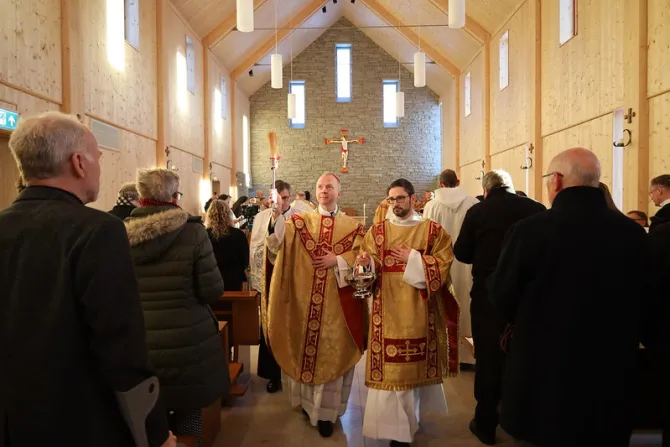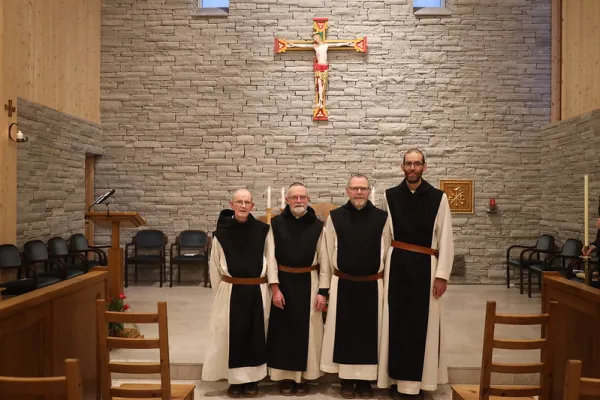Norway’s only male contemplative community of the Cistercian Trappist order consecrated its new church in December, inaugurating a brand-new monastery in the Trondheim Fjord, an inlet of the Norwegian Sea.
The four monks currently living there are dedicated to silent prayer and welcoming pilgrims in the heart of this northern desert.
The Cistercians of the Strict Observance, who came from the Abbey of Citeaux in France — where St. Bernard of Clairvaux lived — settled in Munkeby, near the Norwegian coast, in 2009. The monks chose this relatively desolate central Norwegian region because it is home to 12th-century Cistercian ruins that bear witness to a Christian history with deep, ancient roots.
“Until last Easter, we lived in a house with a small chapel,” Father Joël, head of the monastery, explained to CNA. “After a while, we had to think about something bigger for the future. So we began construction of the monastery and church in 2021.”
Dedicated to the Virgin Mary and housing relics of martyrs and saints of the Cistercian order, the new place of worship has a capacity for about 40 people. The building was finally consecrated on Dec. 5, against a snowy backdrop, in the presence of 80 people.
Bishop Erik Varden of the Prelature of Trondheim performed the traditional rite of consecration, which includes sprinkling with holy water, anointing the altar and walls with the holy chrism, and illuminating the altar.
Many people contributed to the opening of the new church, which sits on a two-hectare (almost five acres) plot of land in the middle of fields. A Lutheran woman embroidered the white altar cloth, a painstaking task that took her months; a neighbor of the monastery forged the candelabras; and prisoners from southern Norway made the consecration crosses.
Monastic life in Munkeby
The four Trappists living at Munkeby — Father Joseph, Father Joël, Brother Bruno, and Brother Arnaud (three French and one Irish) — lead a secluded and discreet monastic life according to the Rule of St. Benedict.
The monks offer a six-room guesthouse for guests wishing to experience a time of solitude and retreat. “On Sundays there can be seven people, sometimes only two… it’s the Church in the northern desert,” Father Joël explained.
“In the region, we’re quite discreet, and that’s what’s needed,” he added. “Norwegians are very reserved people, so we cannot arrive here as conquerors to convert them, and that’s not our style.” On the other hand, the Cistercians offer their church as an easily accessible oasis. “People know that they can come and pray, find a little peace and quiet, or take part in our services, as they wish,” Father Joël said.
Following the “Ora et Labora” motto, the monks of Munkeby pray the services seven times a day — including very early in the morning at 4 a.m. — and work with their hands, producing cheese from milk purchased from local farmers. Their work integrates them into the economic life of the region.
“As it is the case throughout Western Europe, our monastery bears witness to the presence of God in a hyper-secularized society. People love to hear the bells ringing; it gives them a sense of presence and protection. Many people ask for our prayers, writing down very concrete intentions on small pieces of paper that are left in the store,” Father Joël explained.
During the summer in this country where the sun never sets during the hot season, many pilgrims pass through the monastery on their way to the tomb of St. Olav in Trondheim, an important pilgrimage site since the Middle Ages.


Future vocations?
Although the Catholic Church is a minority in Norway — just 3% of the population — it is nevertheless growing rapidly and enjoys great dynamism with lively youth movements. In this environment, the monks are keen to pass on the monastic way of life.
“We really wish to have vocations,” Father Joël said. “There are a certain number of young people over the age of 20 who are walking the path, and that’s very beautiful… but today there’s a lot of resistance. Society, the environment, don’t favor a call to monastic life; we must be very strong to fight against this resistance.”
By Emma Silvestri



Leave A Comment